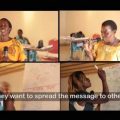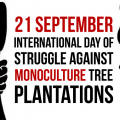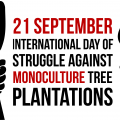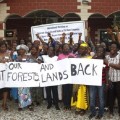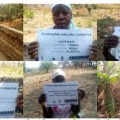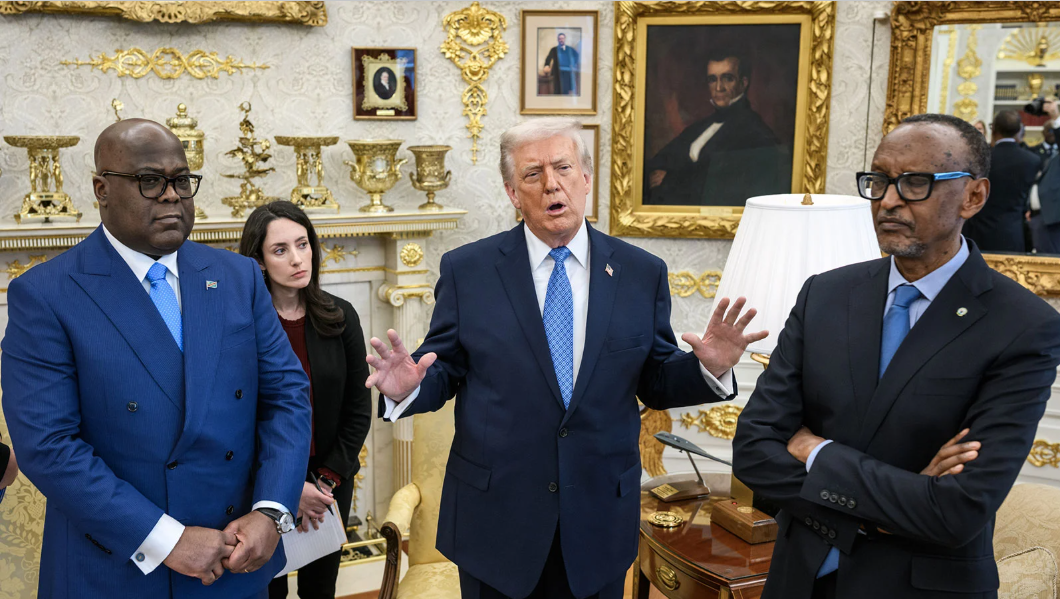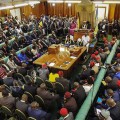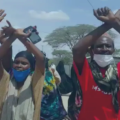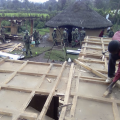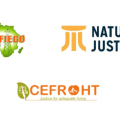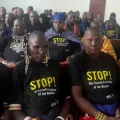On the occasion of September 21st, 2022, the International Day of Struggle Against Monoculture Tree Plantations, WRM launched the briefing “12 Replies to 12 Lies about Industrial Tree Plantations”.
On the occasion of September 21st, 2022, the International Day of Struggle Against Monoculture Tree Plantations, WRM launched the briefing “12 Replies to 12 Lies about Industrial Tree Plantations”.
This briefing was originally published in 1999, under the title “Ten Replies to Ten Lies”. At the time, monoculture tree plantations of eucalyptus, acacia, pine and rubber were expanding in many countries. In this context, WRM identified the need for a simple tool to provide community activists and grassroots organisations with information that could counter the most misleading statements that companies were using to promote these industrial tree plantations.
Since then, the plantation companies have continued to refine their response to critiques of plantations and the plantation model expressed by communities, activists and organisations. Perhaps predictably, instead of addressing the critiques, companies have come up with more lies. This, together with the current renewed push for industrial tree plantations in many countries, motivated WRM to publish a new edition of the 1999 briefing.
WRM’s Campaign Against Monoculture Tree Plantations
The briefing published in 1999 was made in the context of a WRM campaign, launched in 1998, against monoculture tree plantation. As part of this campaign, several tools were produced and activities carried out to support communities in their struggles against monoculture tree plantations. The campaign continues until today.
Why does the tree plantations issue play such a key role in WRM´s work for so long?
One reason is that promoting monoculture tree plantations has been a key ingredient of the main international policies elaborated in the past 30-40 years to address deforestation – in spite of the fact that such plantations are a cause of deforestation. Promoting industrial tree plantations was, for example, one of the pillars of the Tropical Forestry Action Plan, launched in 1985 by the United Nation´s Food and Agriculture Organisation (FAO), in partnership with the World Bank and other institutions. The REDD+ mechanism, in its turn, when it was launched in 2007, stated that, among other things, it was about “increasing forest carbon stocks”, opening the door for promoting large-scale tree plantations as REDD+ projects.
Deliberately confusing plantations with “forests” – while the only similarity between both is the presence of trees – is one more reason for WRM to give a central role to the tree plantations issue in its work. Until today, industrial tree plantations of often exotic species, even genetically engineered trees, are considered “forest” by FAO, the main UN agency dealing with forest issues. It is probably also the main lie that plantation companies have spread around and benefited from.
One more reason for WRM´s focus on tree plantations is the fact that the global South has become the main area targeted for expansion of industrial tree monoculture plantations over the past 30-40 years. The main reason is that in the global South companies find the most favourable conditions to make profits. Among these are cheap and fertile lands, cheap labor and a climate that favors trees, in particular eucalyptus, growing very fast.
Besides, in the global South in particular, the “plantation model” has a long history that goes back to the colonial era. During that era, European powers stole lands of communities to set up profitable export-oriented plantations, based on slave labor, of different monoculture crops. Although liberation struggles formally ended the colonial era, the “plantation model” survived. Corporations claim that nowadays plantations have ´modernized´ their working conditions, that they are “socially responsible” and “sustainable” and have their practices “certified”. However, the main characteristics of the “plantation model” remain unchanged, for example, labor exploitation, the grabbing of huge expanses of community lands and forests and the destruction and contamination of community livelihoods. The neo-colonial plantations of today continue to reflect and strengthen mainly Northern capitalist interests. They also continue oppressing indigenous and black communities and in particular women in the global South, maintaining and strengthening racism and patriarchy.
New Lies Spread by Plantation Companies
Plantation companies continue to use most of the lies they used in 1999, including calling tree plantations ‘planted forests’; claiming that industrial tree plantations are set up on degraded lands; that plantations improve the environment and counteract climate change; that they protect native forests and contribute to job creation and local economies.
In addition, there are a number of new lies. For example, that by substituting fossil fuels, plantations can contribute to a so-called “bio-economy”. They promote planting trees for electricity generation and alternative fuel through “biomass” or “biofuel” plantations”, or producing products for mass consumption such as plastics, textiles or medicines. It is an attempt to counter the critique that tree plantations contribute to the destruction of forests and other biomes, and thus further worsen climate change.
How can industrial plantations and all of their negative impacts be the basis for a “bio-economy” that claims to respect life and nature? Putting the plantation companies’ plan into practice would involve planting entire countries in the global South with eucalyptus trees. Probably the main motivation of the plantation company owners is another: a tremendous new business opportunity.
Another lie that companies spread is that conflicts with communities around land, pollution of water, working conditions, etc., can be solved by “certification” of plantations. The FSC (Forest Stewardship Council), for example, awards a label to a company if it demonstrates that it is engaged in “sustainable management” of its plantations. The FSC label has been a success for companies. Many of them have received the label, even when documents showed that their land titles were illegal or that the company was embroiled in conflicts with local communities. That FSC does not fulfil its promises has to do with the fact it does not question the main characteristics of the ´plantation model´: its large-scale, the planting of trees in monoculture, the grabbing of fertile community lands, as well as of the water in the area.
Following a United Nations Initiative, several companies now also claim that they are committed to the empowerment of women in the workplace, marketplace and community. Corporate gender policies have come up in response to the critiques and struggles of women against the plantation model. The fact that plantation companies have set up such policies is also a response to the committed struggles of women against industrial tree plantations in particular.
But the supposed ´equal´ employment opportunities that companies offer to women hide the common practice that companies take advantage of hiring women particularly for dangerous and poorly paid tasks, if they believe that women carry them out more efficiently. Examples include the very precise work performed in tree nurseries and the application of agrotoxins. Besides, companies destroy the lands women depend on to maintain their traditional knowledge and practices. Companies tend to further reinforce patriarchal structures when they seek and rely on the mainly male-dominated processes of the community approval to use community lands for plantations.
Wherever women stand up, companies have used strategies to break their resistance by intimidating and criminalizing them. Companies usually ignore the fact that their plantations are connected with an increase in sexual violence and harassment of women, one of the most silenced yet perverse impacts of the “plantation model”.
On the African continent where investors hope to make most money in future with plantations, consultants spread the lie that African countries should follow the success story of tree plantations in Brazil and Uruguay. If the measure of success is the wealth of company owners in these countries, those plantations have certainly been a success. The main owner of the biggest Brazilian plantation company is among the richest families in the country. But plantation companies in Brazil have stolen lands from indigenous peoples, black and other communities, and provoked more impoverishment and racism against these communities. In Uruguay, due to a major exodus of rural dwellers, plantations can expand relatively easily. Currently, just 5 per cent of the population lives in rural areas.
Another lie plantation companies spread around is that plantations are financially a very healthy business and thus deserve support. But the main reason tree plantations are profitable for company owners and shareholders is that public and private banks and institutions award generous financial subsidies and incentives to the plantation companies. In reality, most of them are heavily indebted.
The approach companies use to still gain access to fresh funding involves converting part of their debt into so-called ‘bonds’. This approach is usually available only to companies, not to ordinary people. A bond is nothing more than a document worth a certain amount of debt. The company can sell it to receive additional funding. This is an attractive deal for buyers, because the company will pay back the money invested after an agreed upon number of years, plus an additional amount—the interest rate.
“Green bonds” is a new name used by plantation companies to refer to the same bonds as before. Plantation companies call them “green” because they claim their business is “green” and that they significantly contribute to reducing climate change and conserving the environment.
A last, but very important lie is that peasant farmers can benefit from tree plantations. The strategy to involve peasant farmers in the plantations business is a reaction to the widespread resistance of communities around the world to large-scale tree plantations. To avoid evicting peasant farmers to get access to the plan, companies have increasingly been promoting “smallholder” or “outgrower” schemes. Under such schemes, farmers sign a contract with a company to plant trees on their land. Companies promise a good income to those planting trees, and that peasant farmers can continue planting their food crops.
In reality, most of the benefits go to the company, while most of the risks and costs are the farmers’ problem. While companies and governments claim it will improve farmers’ livelihoods and income, it actually does the opposite.
In summary, what all the 12 lies presented in the new WRM briefing paper have in common is that they all seek to hide the damaging nature of the “plantation model” that is at the root of the conflicts, impacts and oppressions that come along with the promotion of industrial tree plantations. Struggling against plantations therefore is in essence the struggle against patriarchy, neo-colonialism, racism and capitalism and all their different forms of oppression.
The full version of the new briefing paper “12 Replies to 12 Lies about Industrial Tree Plantations” is available here. It’s also available in Spanish, French and Portuguese.
Original Source: World Rainforest Movement
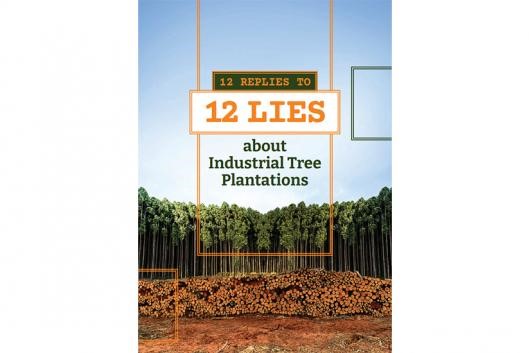

 NGO WORK2 weeks ago
NGO WORK2 weeks ago
 MEDIA FOR CHANGE NETWORK2 weeks ago
MEDIA FOR CHANGE NETWORK2 weeks ago
 MEDIA FOR CHANGE NETWORK2 weeks ago
MEDIA FOR CHANGE NETWORK2 weeks ago
 MEDIA FOR CHANGE NETWORK2 weeks ago
MEDIA FOR CHANGE NETWORK2 weeks ago
 MEDIA FOR CHANGE NETWORK2 weeks ago
MEDIA FOR CHANGE NETWORK2 weeks ago
 MEDIA FOR CHANGE NETWORK7 days ago
MEDIA FOR CHANGE NETWORK7 days ago
 MEDIA FOR CHANGE NETWORK1 week ago
MEDIA FOR CHANGE NETWORK1 week ago
 MEDIA FOR CHANGE NETWORK2 days ago
MEDIA FOR CHANGE NETWORK2 days ago
